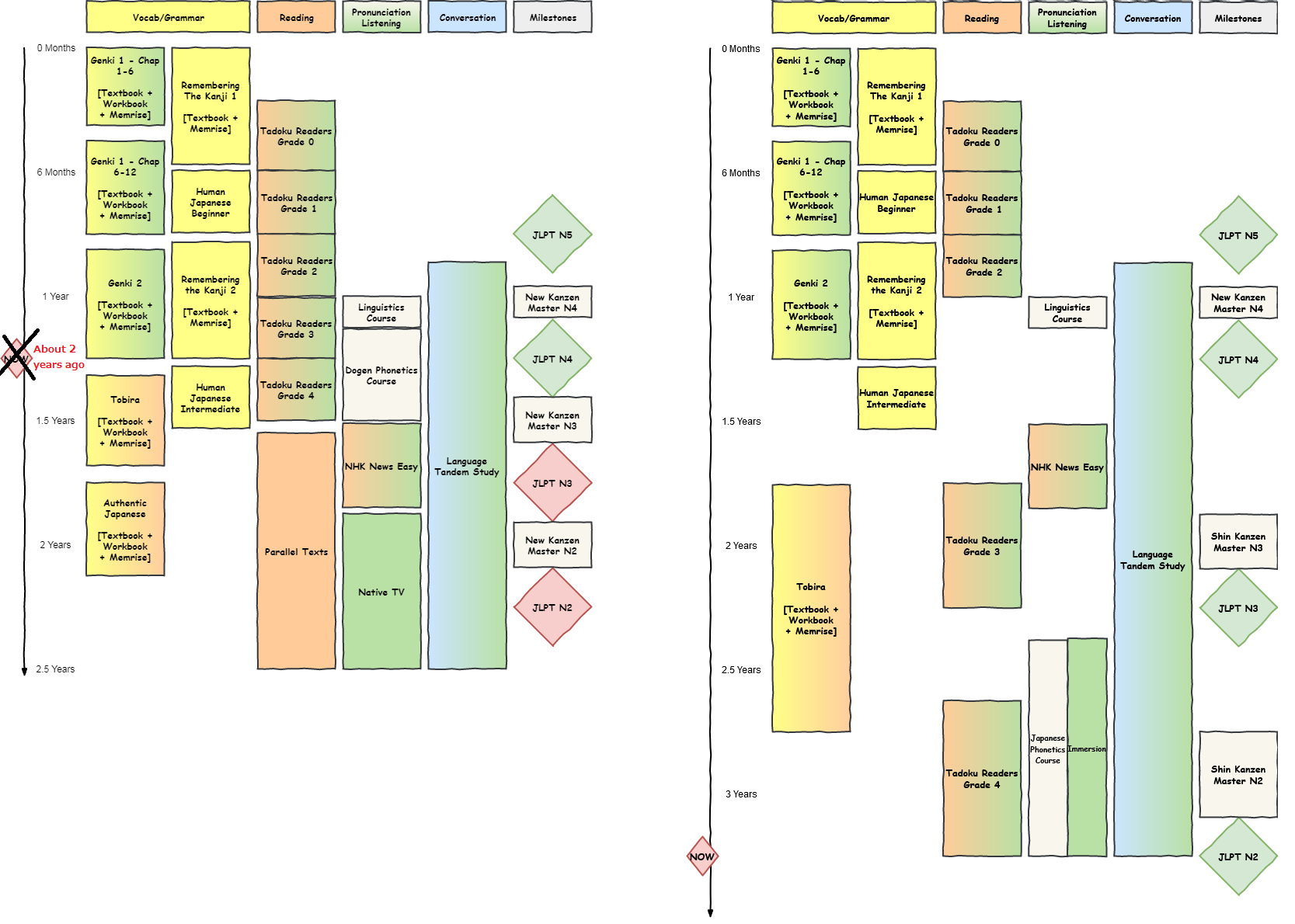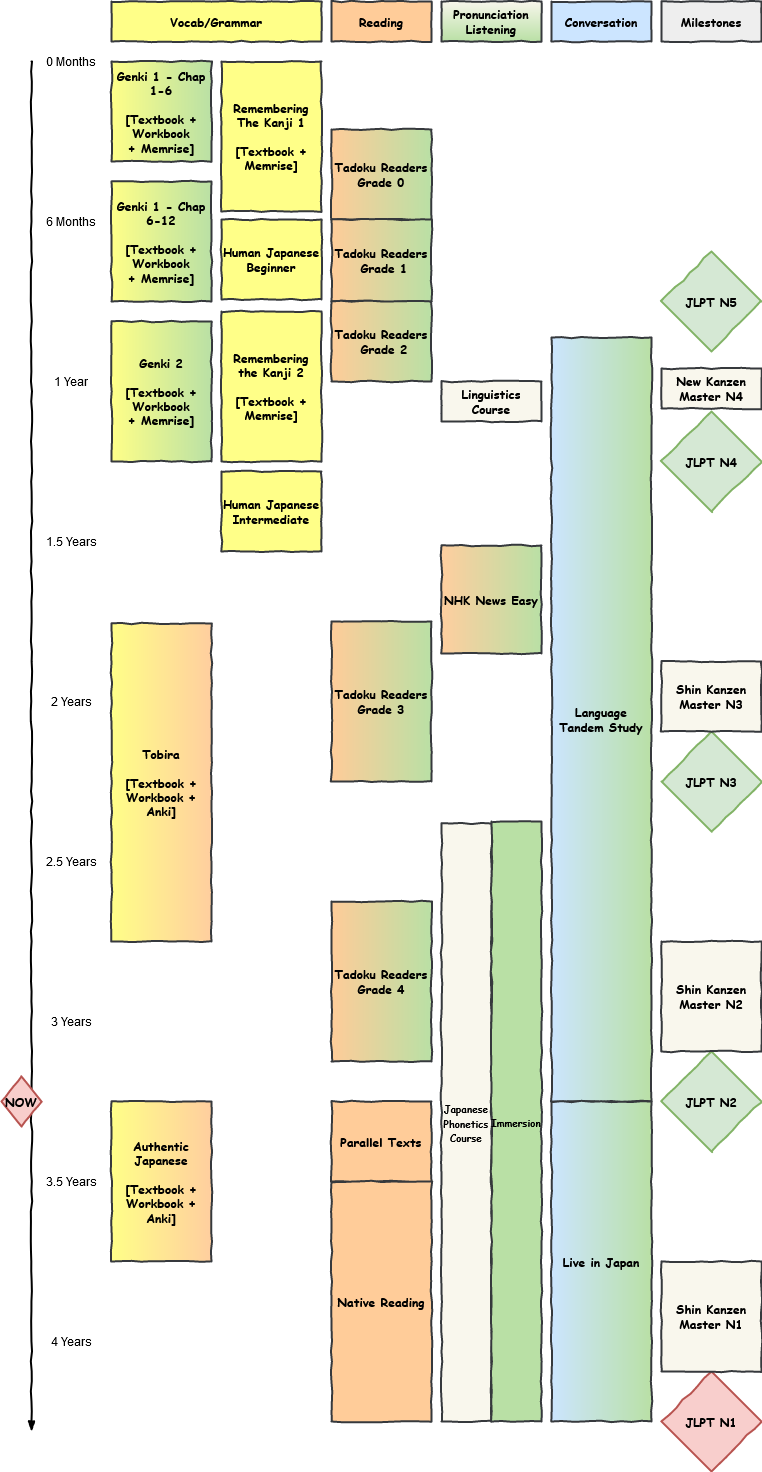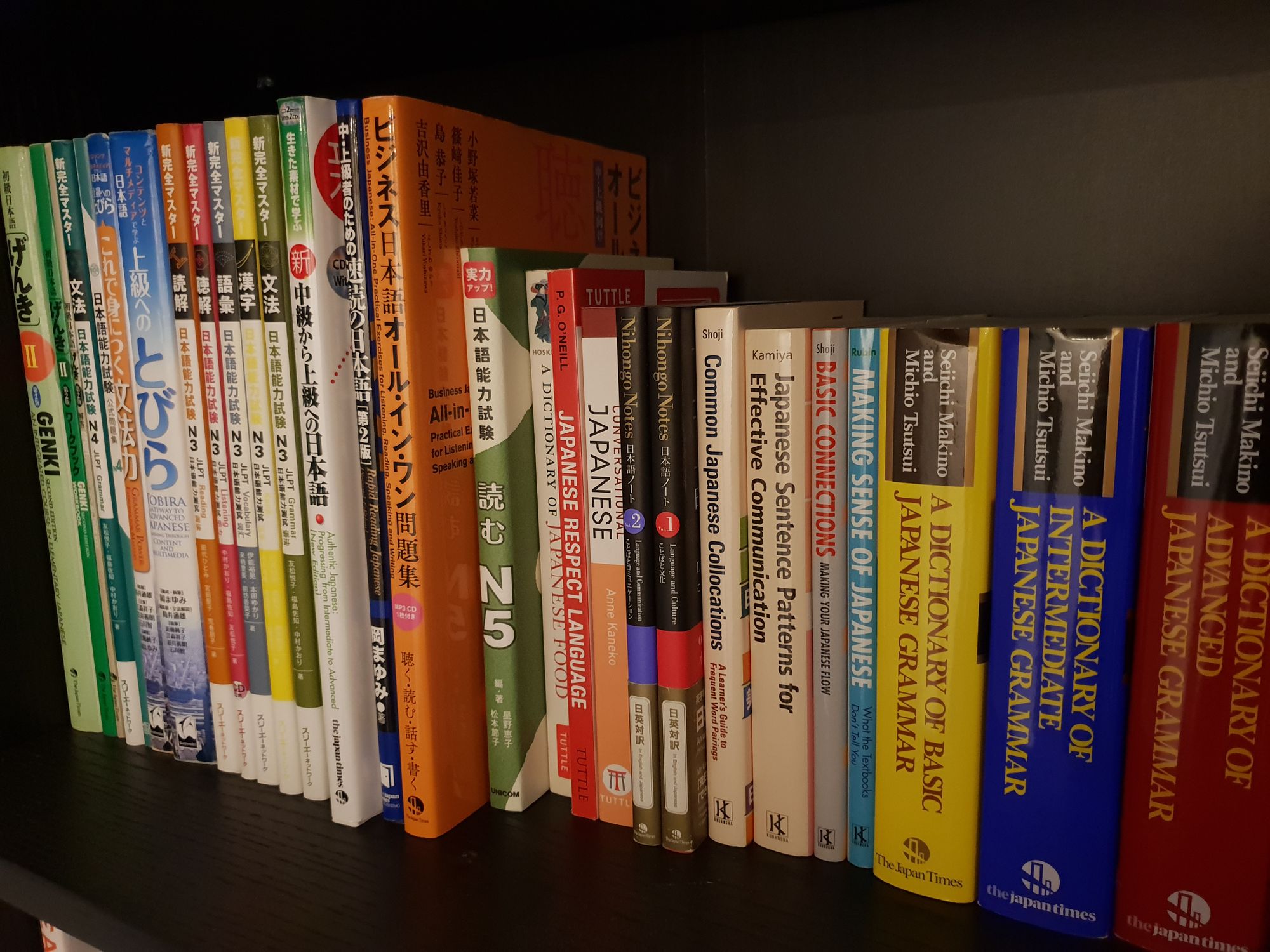I've been studying Japanese for just over 3 years now. I last wrote about it 2 years ago, so it seemed like a good idea to revisit and reflect on my progress.
When I first started studying Japanese I had my past failures in mind. At learning French, and all the other endeavors - novel writing, tennis, basket weaving - which had been picked up for a few months and then discarded. I knew that it would be much easier to stick to Japanese if a) I made it fun, b) I made measurable progress along the way1 and c) I knew how long it would take. So I tried to approach it like a typical engineer and created a plan with milestones and progress checks along the way. I broke down the language into discrete sub skills (reading, listening, speaking, pronunciation, etc) with individual study plans for each.
Ironically, while it did help me stick to it - and I'm much better than I was 2 years ago - I'm also more aware of how far I am from 'fluent' and what a huge task it is to learn the language to fluency. It's taken thousands of hours of study to get to where I am today and had I known that at the start, I may never have started at all. Except that I'm a masochist who thrives off doing difficult things for the sake of pushing myself.
In this post I plan to touch base on my Japanese learning journey at the three year point - my progress, looking back on what changed from my plan, things I've learned, and finally outline my method and future plans. If you haven't read my earlier posts, see here and here for previous progress reports.
Progress
In the 12 month update, I planned to attempt the JLPT N2 after 2.5 years - the second highest Japanese language qualification, and the one that is often asked for by employers. As it happened, I passed the N2 just this last December after 3 years and change. So I'm about 6 months behind my goal. That's a failure on paper, but I consider it a success considering that two years ago I was basically picking numbers out of a hat. Here's the plan I outlined then, vs what actually happened:

I talk about the N levels a bit below. They're a rough guideline for vocabulary levels, going from N5 'can understand the very basics' to N1 'should be able to understand just about everything'. It's important to note that they are by no means a perfect measure of skill2. In reality it's very possible to speak fluent Japanese without being able to pass N3, or to pass N1 and read a novel without being able to speak confidently at all.
So what differed from my plan?
- I haven't yet started the 'Authentic Japanese' textbook - as it turns out, this textbook is somewhere between N2 and N1 level and not actually a prerequisite to pass the N2.
- Tobira (An upper-intermediate textbook) took twice as long as expected. In reality, trying to get through Tobira in 6 months was an impossible goal when taking into account work and life commitments. It would be possible if I studied more hours per week, but I didn't. It took me about a year to get through at a rate of one new chapter every 3 weeks, plus one repetition of each chapter after a couple of weeks to solidify the concepts.
- Graded readers were harder than expected. I've just finished the Grade 4 readers now, as they correspond to the N2 level. Once you hit N2 level you have a solid enough foundation to tackle most native level texts with the aid of a dictionary.
- It took me longer than it should have to start watching native TV. See the below section on Comfort With Ambiguity on why this is.
- I switched to Anki instead of Memrise; these are both 'spaced repetition' apps. The process set me back about 2 months in my language learning but was necessary for further progress and has paid dividends since then.
My future plans are at the bottom of the page. Read on and see it in like two minutes, or use the power of scrolling quickly to skip down to the bottom.
Logistics and Tools
Just going to cover a few tools here, specifically the ones that I didn't already mention in my 1 year post.
Anki

I plan to cover this fully in a future post but in essence - don't make my mistake, use Anki over Memrise. Anki is better than Memrise mostly due to flexibility, ability to quickly edit flashcards when you want to add more to them or rephrase something.
Making your own flashcards is an important part of the process of learning. If I was starting afresh I would never have used a deck made by someone else. The Memrise tools are clunky for this but Anki makes it very easy to edit on the fly.
One other small tip - don't overdo it on the Anki or your life will become review hell. Delete words you already know and will never forget, and don't add words if you can intuit their meaning from your existing mental Language Web. I made the mistake of adding every single new word I learned, even obvious ones derived from English. At the worst point I was at 500 reviews a day, spending one or two hours a day just on reviewing vocab, and had to fix it by doing a spring clean of my Anki decks.
Kanji Study

Kanji Study is an app I use for roughly ten minutes a day to practice writing the kanji characters. It's made by a single motivated developer, and includes tools like random testing and handwriting detection. I didn't study the writing of Kanji when I began studying Japanese because I assumed that, thanks to the proliferation of computers and smartphones, I wouldn't need it - I don't often put pen to paper in 2020.
Since then I've changed my opinion; studying the writing of Kanji helps to add another link in my Language Web. It reinforces what's already there, aids in recall of Kanji that I don't see often, and helps distinguish between similar kanji like 殻 and 穀, which are easy to confuse unless they're right next to each other.
HiNative

HiNative is a language Q&A platform that helps you ask questions to native speakers. It's a really handy tool to understand nuance of similar words. There comes a point when you start seeing the same English words applied to different Japanese words (although you can avoid this by simply using monolingual definitions), for example:
- 制限 vs. 限定 - both mean some form of limit or restriction, but the former is used for restrictions by law or due to some rule, whereas the latter is usually used in shops for things like 'limited time' offers.
- 預金 vs 貯金 - both refer to savings, but the former generally applies specifically to savings in a bank account, vs the latter which refers to the general concept of saving money.
- 広める vs 広げる - both mean to spread or expand, but the former usually refers to spreading a non-physical phenomena like information or a policy, and the latter to physical phenomena such as the spreading of wings.
You get the idea. These differences are recognizable intuitively after seeing the words in context tens or hundreds of times, and ultimately you still need to see the word in your immersion multiple times to internalize the meaning, but HiNative can be a useful shortcut.
Onwards to N1
With all that said, how do I actually plan to continue my studies and how do I recommend you study if you're just starting out? There's no short answer because everyone learns differently, but if you're dedicated to really learning the language to fluency, I recommend using the Mass Immersion Approach and following the guide there.
If you don't like that approach because it looks too hardcore - well yeah, learning Japanese is hard. You will not learn this language to fluency without many hours of work, I guarantee that. This is what I've done and how I plan to continue:

To a large extent, the hard part is already over. Depending on how I look at it, I've already achieved my goal of speaking Japanese - I can comfortably navigate everyday life, conversation about complex topics, understand most native media, and struggle through more complicated novels and texts. If I wanted3 I could also get a job at a Japanese language workplace with my N2 qualification.
But I'm still not fluent. I can't read anything quite complicated without referring to a dictionary; you don't want to know how long it took for me to read my apartment lease, or understand how to use the water heating system in my apartment here in Tokyo. I get mentally tired after consuming Japanese media or speaking for long stretches of time, and I still make a lot of mistakes. I intend to continue my studies until I've passed the N1, can speak without effort, and can comfortably read or watch anything I want to without looking things up. To do this, I'll immerse myself more, read more, and work my way through the last textbook in the series I've been following.
Next up will be a post about various things I've learned in the last two years. The post is already 90% written so it should only be a week or two away.
- Although the longer I study, the more I realise how impossible it is to put a single number on language ability. Speaking, listening comprehension, pronunciation, skill at comprehending the news vs ordinary conversation vs anime vs a legal document, all are wildly different skills. ↩
- Rough definitions are here but it's impossible to really understand what that means without taking the tests yourself. ↩
- I don't. ↩
